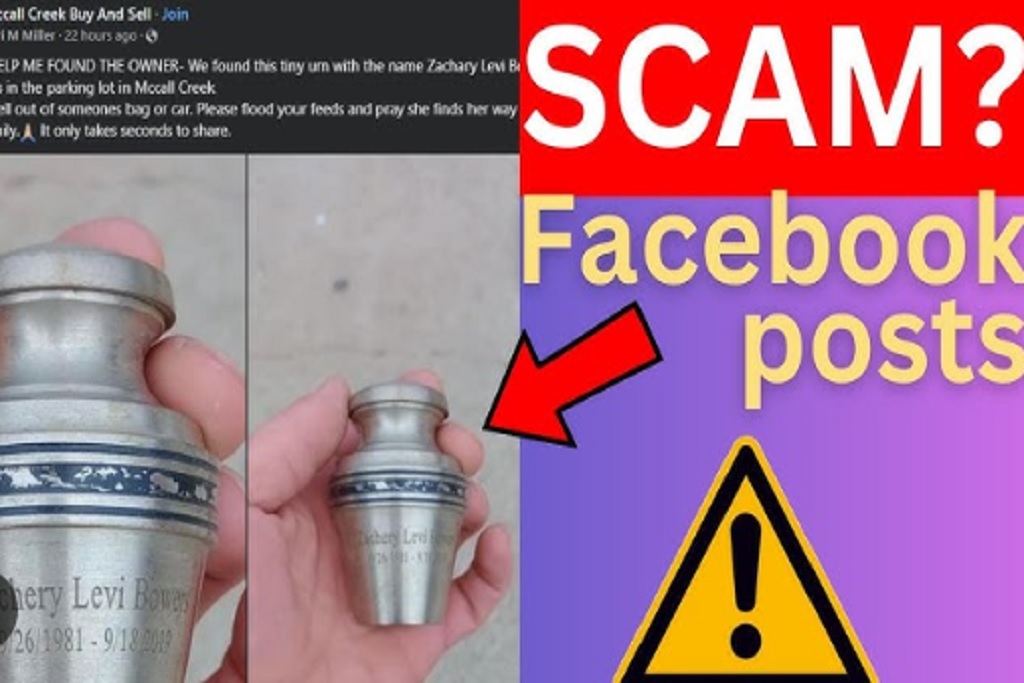A rogue Facebook post, claiming to have discovered an urn with the remains of Zachary Levi Bowers is making the rounds, pulling at the heartstrings of people and encouraging people to share the story. However, this is a clever scam that is designed to take advantage of emotions to further gain.
How the Scam Works
The fraudsters employ sophisticated techniques to spread the word about this scam’s virality:
1. Post on Emotional Topics
With the claim that it has found the remains of a loved ones, the blog post draws people’s hearts. The idea of bringing the remains of the deceased with their family members is sentimental enough to spur sharing.
2. Make it Urgent
The use of words such as “flood your feeds” conveys an urgency that can lead people to fast shares without fact-checking. The urgency of the message gets it to the attention of many more people in a shorter time.
3. Encourage Mindless Sharing
“It’s only a matter of seconds to share” or “It only takes seconds to share” dissuades the ability to think critically and creates the impression that it is an unthinking, selfish act to share the blog post.
4. Use Fake Accounts
The scam is propagated between fake accounts, typically with AI-generated profile pictures. The trick is to fool people into believing that the accounts of real people are posting the fake posting.
5. Edit the Post Later
After the post has gone viral, criminals may alter the content to include links that are malicious or alter the story completely and still keep all the shares and exposure.
6. Benefit from Viral Reach
Through a viral blog post that has gone viral, scammers have a large audience of thousands that they can leverage through various illicit methods including phishing sites and advertising frauds.
Scam Overview
The article in question includes an image of a hand holding an urn that is engraved on it with “Zachary Levi Bowers” and an explanation that the urn was discovered in a parking area located in Pensacola, Florida. It asks users to “flood your feeds and pray she finds her way back to her family.”
On first sight, this appears as a noble effort to bring back a loved ones’ cremains. However, Zachary Levi Bowers tragically died in 2019, which was documented on the memorial page, which was created by the family of his deceased loved one. The post is revealed to be a complete scam by using Zachary’s name as well as his death in a way that is not legitimate to fuel shares.
ALSO READ
Yearsts Review: Yearsts com – Scam or legit?
Theprostadine Review {2024}: Is Theprostadine com Legit or a Scam?
Portable Air Conditioning Split Max Review: Promo-haus com – Scam or legit?
This scam follows a typical method used by fraudulent Facebook pages to become viral:
Aims at heartstrings and tugs at them through an emotional story
Requests shares to help reunite pets or a loved one who has gone missing
There are no key information or reliable sources
Makes use of fake accounts to initiate and spread fraudulent posts
The aim is tapping into the human empathy to increase shares, clicks, and gain traction. However, behind the heartwarming façade is a dark motive.
Frequently Asked Questions
1. What exactly is the Zachary Levi Bowers’s ashes Facebook fraud?
It is believed that the Zachary Levi Bowers ashes Facebook scam is a popular hoax post that features a picture of an urn believed to contain the remains of Zachary Levi Bowers. The post states that the object was found in the parking lot of Pensacola, Florida and implores users to share the post to allow the ashes to be returned to the family of Zachary Levi Bowers. But, Zachary tragically passed away in 2019, which means this is a scam that is designed to make waves by leveraging emotions.
2. What can I do to identify this the ashes Facebook fraud?
The warning signs of this scam are:
The claimant claims to have found an urn that contains the ashes of a certain deceased person
Uses language that is urgent, such as “flood your feeds” to force shares to be shared quickly
Encourages sharing, without checking facts
The idea was propagated via fake accounts
Photo shows an urn which could be belonging to anyone
Searchable online for deceased person to identify the existence of a fraud
3. Who is the person behind the Zachary Levi Bowers’ ashes scam?
This scam is propagated through fraudsters employing fraudulent Facebook accounts to appear as kind-hearted finders of the Urn. The aim is to generate viral content using emotions of compassion and urgency. The true source is difficult to trace and accounts are often shut down following the spread of the scam.
4. What is the Zachary Levi Bowers ‘ ashes Facebook scam function?
The scammers employ psychological techniques to generate virality
The heartstrings are tugged by the story of reuniting the remains of a deceased loved one.
Communicating urgency to share without thinking
Promoting mindless sharing like it’s risk-free
Making use of fake accounts to start and publish the blog
Ensuring massive reach, then editing the post to conceal malicious intentions
5. What is the reason scammers have created this an ashes Facebook hoax?
The ultimate goal is make a post viral that has a huge reach and then use it to serve harmful purposes, like:
Revenue from advertising
The spread of malware and phishing links
Making fake follower counts
Data from the selling account
Propagating shady products and services
An emotional hook a way to increase shares fast.
6. What do I do if I did share with you the Zachary Bowers urn scam?
If you have shared this fraud, immediately:
Remove the post in order to stop the spreading
Make any other posts editable to indicate that they are fraudulent
Report the fake account and post to Facebook
Inform your followers and friends about your warnings
Check your sharing habits and be sure you don’t repeat this
7. How can I stay clear of the ashes Facebook frauds and scams that may occur in the near future?
Be wary of any viral content that calls for urgent shares
Check the accuracy of stories using websites that verify facts before you share them.
Beware of scam red flags such as no reliable sources
Turn off auto-sharing for timelines.
Create friction prior to sharing such as requiring a the sharing to be in a preview
Make sure you are using your best judgement before spreading scams that could be a scam.
Be on guard and beware of falling for emotional manipulative viral posts in the near future. Be sure to check before sharing!
The Bottom Line
The Zachary Levi Bowers’s ashes article illustrates how scammers exploit emotions and psychological factors to generate frauds that are viral. Be wary of any message that asks for urgent sharing, even if it tugs at your heart strings. Make sure you verify the content before sharing it and do not share information from sources that aren’t trustworthy.
With vigilance, and a healthy sense of skepticalness, we can spot these scams, which are akin to viral ones, before they accomplish their manipulative goals. Do not fall for their tricks to fuel their fraudulent methods and tricking vulnerable individuals.





